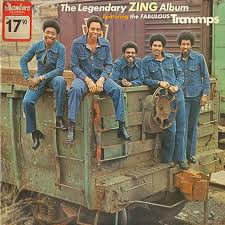Burned Hot Before the Inferno: Remembering Jimmy Ellis

BurnedHot Before the Inferno: Remembering Jimmy Ellis byMark Anthony Neal | NewBlackman
Itis perhaps some concession, that the only reason the death of Jimmy Ellis, thelead singer of The Trammps, was so widely covered, was the appearance of thetrack "Disco Inferno," on the soundtrack of the 1977 film Saturday Night Live. Though the Trammps are often referred to as "one-hit wonders," thewildly popular "Disco Inferno" came at the end of what had already been adistinct career in Dance music for the group. That the group is largely known only for that song—far fromtheir best—speak volumes about the way Black musical genius was so oftenincubated, and thrived, beyond the gaze of mainstream culture.
ThoughEllis was born in Rock Hill, SC, growing up singing Gospel as so many of hispeers did, it was in Philadelphia that he connected with Earl Young, RonaldBaker, and Norman Harris, who alsoworked as studio musicians at Sigma Sound and performed as members of thePhiladelphia International Records (PIR) house band MFSB.
Inits earliest incarnation, the Trammps were known as the Volcanoes, and withtheir hit "Storm Warning" (1965) helped establish the "Philly Soul" sound, thatwas as indebted to street corner Doo-Wop singing as it was to the popular groupThe Coasters. By the time Ellisbecame lead singer of the group in the early 1970s, the trio of Young, Baker,and Harris—PIR's Holland-Dozier-Holland—were looking for side projects tocounter the exploitation they felt they were experiencing at PIR.
Young,Baker and Harris recorded several tracks with The Trammps in 1972, with Ellisas lead including, "Zing! Went the String of My Heart,"—a remake of the Judy Garland classic thathad also been covered by The Coasters—"Pray All You Sinners," and "Hold Back the Night." The productiontrio also worked with First Choice, recording pop-Dance classics like "Armedand Extremely Dangerous" and "Smarty Pants." The tracks represent theprototypical sounds of what would become known as Disco music in themid-1970s—in his book Turn the BeatAround: the Secret History of Disco, Peter Shapiro suggest that drummerEarl Young "pretty much invented the Disco beat." Though Trammps' tracks were hot in the clubs, the group'slabel Buddah declined to release an album of their material, sensing that thegroup was limited commercially.
Inorder to quell the coming rebellion of PIR musicians like Young, Baker andHarris, PIR allowed them to record as MFSB and also offered the Trammps aproduction deal and their own imprint "Golden Fleece." Their first album for PIR in 1975,produced the hits "Love Epidemic" and "Where Do We Go From Here." With theirnew found popularity, assisted by the strength of PIR's promotion, Buddahreleased the early Trammps music on the LegendaryZing Album. With the releaseof those two albums, The Trammps' role as architects of the Disco movement wasalready secure, a position that was only enhanced with the release of theirAtlantic Records debut and the lead single "Where the Happy People Go," whichquickly became an anthem for the era and the group's highest charting popsingle at the time.
"DiscoInferno" was initially released as the title track of the group's second albumfor Atlantic in late 1976; it barely registered to pop audiences, not evenbreaking into the Pop-Top 40, though it was a top-Ten R&B hit. By the timeThe Trammps released Trammps III inNovember of 1977, "Disco Inferno" was in their rearview, and the group wastrying to recapture the magic of their early records with a track like "TheNight the Lights Went Out," inspired by the New York City Blackout of thesummer of 1977, which Jeff Chang has suggested, might be the night that Hip-Hopfinally went all-City.
Asa single, "The Night the Lights Went Out," was dead in the water; The Trammps'fortunes would change when the soundtrack for a little movie, starring awell-known Sweathog, was released in December of 1977. The soundtrack for Saturday Night Fever, sold over 15 million copies and topped the Billboard charts for six-months, makingthe Bee-Gees households names, and giving the Trammps their last breathe ofmainstream recognition; "Disco Inferno" peaked at #11 on the pop charts in1978.
Formany Jimmy Ellis, is just an afterthought from a period that has beenoft-derided and continuously commodified in movies and television shows; aperiod that is divorced from the Black, Latino, and Gay roots that madeso-called Disco music such a powerful social and cultural force in the early1970s. As Shapiro writes, The Trammps, "replaced the tension at the heart ofGamble and Huff's signature sound with a whole-hearted embrace of theDisco." Jimmy Ellis was the voiceof that movement.
***
MarkAnthony Neal is the author of five books including the forthcoming"Looking for Leroy: (Il)Legible Black Masculinities" (New YorkUniversity Press) and Professor of African & African-American Studies atDuke University. He is founder and managing editor of NewBlackMan and host ofthe weekly webcast Left of Black.Follow him on Twitter @NewBlackMan.http://www.salon.com/writer/mark_anthony_neal/
Published on March 09, 2012 08:49
No comments have been added yet.
Mark Anthony Neal's Blog
- Mark Anthony Neal's profile
- 30 followers
Mark Anthony Neal isn't a Goodreads Author
(yet),
but they
do have a blog,
so here are some recent posts imported from
their feed.



